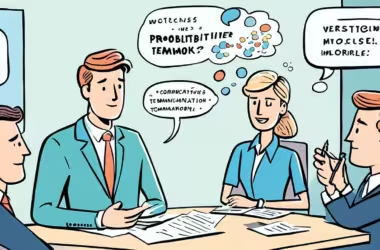Have you ever wondered why some software development teams do better than others? It often boils down to trust and collaboration. In today’s fast-paced tech world, building these elements is key. They help achieve success and improve team unity.
Effective communication is crucial for developers. It affects their collaboration during important tasks like gathering requirements, approving designs, and reviewing code. Clear communication improves understanding. It also creates an environment where creativity and innovation can grow. When team members work together well, they build a culture of accountability and respect. This leads to better quality and reliability in their projects.
As teams grow and become more diverse, building strong relationships is more important than ever. Studies show that team culture greatly impacts trust and collaboration. This makes it an important area to work on. By investing in communication training and celebrating wins together, companies can raise morale. This strengthens team bonds, leading to a happier and more productive workforce.
Understanding the Importance of Trust in Software Development Teams
Trust is crucial for software development teams’ success. It makes effective communication possible, encourages feedback, and aligns team goals. Without trust, team members might not share ideas or admit mistakes. This can stop innovation and progress.
A positive team environment fosters open discussions. Members feel respected and valued. To build trust, clear dialogue and respect for each individual’s contributions are key. Solving problems together helps tackle the challenges in software projects.
- Transparency promotes collaboration and increases efficiency.
- Constructive conflict management is essential for smoother project navigation.
- Encouraging feedback drives continuous improvement and innovation.
Creating a psychologically safe environment is crucial for trust in teams. Team members should feel free to share their thoughts without fear of judgment. This enhances morale and strengthens relationships.
Defining clear roles and responsibilities reduces confusion and improves teamwork. Allowing teams to self-organize leads to job satisfaction and innovation. With advancing technology, using collaboration tools boosts trust and coordination in software development.
The Role of Collaboration in Software Development
Collaboration is key in software development. It sets successful teams apart from the others. Working together boosts productivity and leads to new solutions. A study by the Project Management Institute shows that 75% of top projects rely on teamwork. This underscores the value of working together to meet project goals.
Tools like Google Drive help teams communicate better. They make working together smoother by reducing issues with documentation and too many emails. The Standish Group found that teams who collaborate well are 62% more likely to succeed.
Open communication and respect are crucial in software engineering. A report by Gallup reveals that teams with high engagement are 21% more profitable. This shows that good collaboration drives better performance and teamwork.
86% of employees see poor collaboration as a big factor in workplace failures. It’s important to build a culture that values teamwork for success and to keep everyone involved. When teams work well together, they build trust which is key for reaching their goals.
Key Strategies for Building Trust and Collaboration in Software Development Teams
Building communication in teams is key to trust and collaboration in software development. When team members talk clearly and with respect, they understand each other better. This creates a supportive environment. It makes team members feel valued and fosters a culture of innovation and trust.
Effective Communication Practices
Communication is key in software development. Important strategies include:
- Regular check-ins: Frequent meetings keep everyone informed and tackle issues quickly.
- Open forums: Ideas and feedback are shared, which helps everyone understand better.
- Transparent processes: Explaining project goals and roles clearly avoids confusion and fosters ownership.
Sharing knowledge improves team dynamics. Agile teams often finish projects on time 20% more often than traditional teams. This success is due to good communication and teamwork, keeping everyone informed.
Encouraging Proactive Collaboration
Being open, flexible, and eager to consider new ideas is crucial for collaboration. Knowledge-sharing boosts creativity and engagement. Asana found that 82% of workers are more productive with project management tools. These tools help with planning and tracking, making teamwork more efficient.
High-trust organizations see many benefits. They report 106% more energy and 76% better engagement. Productivity is 50% higher than in low-trust places. Members of these teams experience 40% less burnout and 74% less stress, leading to a healthier work life.
Best Practices for Team Collaboration and Trust
In today’s dynamic work environments, using effective collaboration tools is key. These tools help improve outreach and efficiency. Through best collaboration practices, organizations create a trust-filled and connected atmosphere among team members.
Utilizing Collaboration Tools
Collaboration tools are crucial for trust and smooth communication in software development teams. Tools like Asana and Microsoft Teams make project management easier. They also bring transparency to team dynamics. Here are key actions to take:
- Establishing clear expectations: Clear roles and responsibilities cut down on confusion.
- Promoting accountability: Encouraging team members to be responsible builds trust.
- Offering regular check-ins: One-on-one meetings help team members talk about concerns and strengthen bonds.
- Incorporating feedback mechanisms: Instant feedback through tools boosts collaboration and kindness.
- Encouraging participation: Features like polls and breakout rooms make team members more engaged and talkative.
Transparency is key to building trust. It’s important for organizations to use conflict management strategies that push for open communication. By dealing with conflicts openly, teams can keep their trust and unity strong. Plus, creating a culture of recognition makes team members feel important. This feeling of belonging is vital for successful team work.
Impact of Team Culture on Trust and Collaboration
The team culture in software development is key for trust and working together well. A good culture welcomes everyone’s ideas openly. This makes people want to participate more.
Studies show that people who really feel part of the culture work better. They are 3.7 times more likely to be involved in their work. Also, they are 68% less likely to feel too tired.
Having a strong team culture also keeps workers around longer. Those who connect with the culture are 55% less likely to look for a new job. In 2022, three times more workers left their jobs because of bad team culture than for better pay or benefits. This shows how important a good team environment is.
A culture that encourages working together leads to more sharing of ideas, solving problems, and coming up with new things. Teams that feel supported by their culture are 14% more productive. But, unhappy workers could cost a lot, up to 18% of their yearly pay.
Tools like Google Workspace and Microsoft Office help teams work better together. They allow for sharing documents and managing projects in real time.
Companies like Google show how great culture helps a lot. There, 72% of staff are driven by what the company stands for. This environment not only helps people work together but also builds trust. It’s clear that a strong culture is vital for software development projects to succeed.
Real-world Examples of Successful Software Development Teams
Successful software teams often learn from open-source collaboration. This approach offers insights into working efficiently and innovatively. By looking at examples from this area, teams can understand how to work better together.
Lessons from Open-Source Projects
Take projects like Linux and Apache Hadoop, for instance. They show how people from across the world can come together to reach shared goals. These efforts are great examples of teamwork in software development. They bring together talent from various places.
This way of collaborating also makes software more secure. Plus, it helps products improve quickly. Here are some benefits:
- Learning from open-source lets developers get hands-on with big projects.
- Having many developers contribute promotes creativity and problem-solving.
- Working on open-source projects is great for learning new skills, which is good for a developer’s career.
- Effective software teams use methods from these projects to speed up their own work.
Leveraging Agile Methodologies to Enhance Collaboration
Agile methodologies give software development teams a clear framework to better collaborate. They include work sprints and daily meetings. Teams can check their progress regularly and solve any problems quickly. This makes their work environment more lively. They can talk more easily and work together towards shared goals.
Agile helps teams do more than just complete tasks. For example, companies like Spotify have embraced agile for more team freedom and innovation. This lets teams quickly react to what users want. They make sure their projects meet market demands.
Agile project management tools notably boost team productivity. They show project progress through visuals. This helps everyone communicate and coordinate better. With instant messaging, video calls, and file sharing, misunderstandings are less common. This creates a teamwork spirit that drives everyone.
It’s important to consider how easy to use, scalable, and connectable the agile tools are. Good usability, like agile boards and dashboards that you can change, makes work flow better. Teams feel more involved. Plus, the detailed reports from these tools help with making informed decisions. They show clearly how the project and team are doing.
Using agile methods in software development boosts team collaboration. It also adds flexibility for changing project needs. This approach leads to higher productivity and success for development teams.
Building a Diverse Team for Enhanced Innovation
Diversity in software teams is key for innovation through diversity. Individuals from different backgrounds bring unique ideas. This leads to inventive solutions to tough problems. Their varied thinking helps teams perform better and quickly adapt in a fast-changing business world.
The benefits of diverse teams go beyond just being creative. They make problem-solving easier, enhance knowledge sharing, and boost continuous growth. Studies have found that diverse teams are 87% better at making decisions than non-diverse ones. This shows inclusivity leads to superior outcomes.
A culture that values diversity ensures team members feel safe to take risks and share ideas. Key factors like being open to feedback and having mutual respect strengthen enhancing team performance and productivity.
- Instant Messaging: Provides a platform for quick queries and updates.
- Video Conferencing: Enables in-depth discussions and virtual meetings.
- Collaborative Workspaces: Supports ongoing project collaboration.
Companies promoting diversity see more creativity, higher engagement, and satisfaction among employees. Gender-diverse companies are 15% likelier to outperform others in profits. A Deloitte survey showed 83% of millennials are more engaged at work in a diverse culture. This highlights the importance of diversity for employee morale.
Conclusion
The journey to build trust in software teams is ongoing but key for success. Good communication is vital. It helps when everyone knows the project details.
Efforts put towards emphasizing value of quality, responsive support, and close client make teamwork better and lead to innovative software.
Using agile methods and learning from real examples guide teams to success. Trust and teamwork are essential for innovation and excellence in projects.






